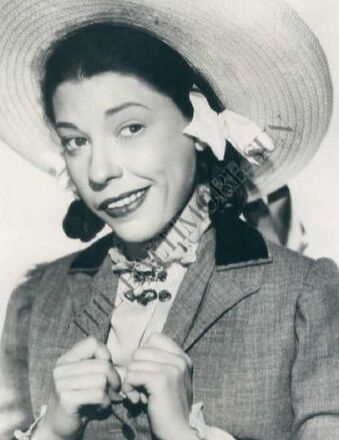1932-33
1933-34
1934-35
1935-36
1936-37
1937-38
1938-39
1939-40
1940-41
1941-42
1942-43
1943-44
1944-45
1945-46
1946-47
1947-48
1948-49
1949-50
James Petrillo
About
GOld
Time Radio
This week's notes from Jim
Ramsburg, the Publisher
(The links go to
the highlighted GOld Time Radio articles) |
|
|
GOld Time Radio chronicles
each of the 21 broadcast seasons, (Running from September through June),
from Network Radio’s Golden Age, 1932 to 1953.
The lengthy and informative profiles of each season
are concluded with an exclusive review of their Top
50 Prime Time Programs, as determined by Crossly,
Hooper or Nielsen rating services.
Each synopsis presented here links to the complete detailed
article. |
Every Month GOld Time Radio features a calender of events
that occured on each day in that calendar month during the
Golden Age of Radio... that's 1932 to 1953.
|

JUDY CANOVA IN THE COSTUME BEFTTING A
COUNTRY BUMPKKIN.
THE
QUEEN OF CORN
It took radio and a
major sponsor, (Colgate-Palmolive-Peet), nearly
a decade to recognize a Network Radio star that
Rudy Vallee and Paul Whiteman had discovered in
the mid-1930's. Yet, when network and
advertising executives looked at the movie box
office records recorded by
Judy Canova films
in the heartlands of America, it was obvious
that she was overdue for a network debut in
1943.
GOld Time Radio's salute to this often
forgotten star begins with her appearances on
the Chase & Sanborn Hour in the 1930's
and follows through with a number of examples of
why The Judy Canova Show was among
Saturday night's top shows for a decade. Of
special interest are her three solos per show,
often displaying unexpected and outstanding
vocal gymnastics. Many of these highlights are
indicated in the post
Judy Canova. It's
well worth listening.
THIS
WEEK IN THE GOLDEN AGE is
one of those rare seven day periods when most of
its events from Network Radio's Golden Age took
place or related to the 1930's. So, test your
knowledge of broadcasting history with our seven
puzzlers, fill-in the correct dates and then
check your answers with the 759 events in the
newly expanded and edited
March In The Golden Age.
March 8,
193_:
CBS buys back 49% of
its stock from Paramount Pictures and obtains
total ownership of the network. (See
Radio Goes To The Movies.)
March 9, 193_: Warner Brothers
celebrates the 10th anniversary of its KFWB/Los
Angeles with a film star packed two-hour show,
during which Harry Warner credits the call sign
to his father for representing, “Keep
Fighting, Warner Brothers.“ (See
Radio Goes To The Movies.)
March 10, 193_: Don Lee’s
experimental W6XS(TV)/Los Angeles transmits
Pathe Newsreel clips of the Long Beach
earthquake several hours after it occurred.
March 11, 195_: Jim & Marian
Jordan celebrate their 20th anniversary as
Fibber McGee & Molly on NBC. (See
Fibber McGee Minus Molly.)
March 12, 193_: NBC reporter
Max Jordan scores a scoop with his shortwave
reports from Vienna of Germany’s move to annex
Austria.
March 13, 194_: Ralph Edwards
takes his Truth Or Consequences on a
three-month, cross-country tour with War Bonds
required for admission to his shows. The first
two weeks result in $1.5 Million in sales. (See
Truth Or Consequences.)
March 14, 194_: Producer Louis
Cowan holds an “out of town tryout” for his new
ABC giveaway show Stop The Music! with
a one time feed from New York City for broadcast
only on WAGE/Syracuse. (See
Stop The Music!)
|
NBC WAS
IN A SAD STATE WHEN the
1949-50 season began. Its perennial Top Ten star,
Jack Benny, had defected to CBS six months earlier,
taking with him the high ratings and Lucky Strike
sponsorship money which angered its affiliates who
demanded a reaction. (See The
1948-49 Season.)
The network responded with Hollywood
Calling,
combining the big money elements of popular givaway
shows with the appeal of popular movie stars and
host George Murphy talking directly to their
contestants, called at random. What appeared to be
a sure-fire winning format backfired into NBC's first regrettable
attempt to bring down Jack Benny. The universally
panned fiasco is described in GOld Time Radio's post, Hollywood
Calling.
GOLD TIME
RADIO BEGINS ITS EIGHTH YEAR with
a long look at weekday dramas, (aka Soap Operas),
the 15 minute serials that proliferated Network
Radio from the mid 1930's until 1960, peaking in
1938 when 48 separate quarter-hour serials were
broadcast every Monday through Friday. We look at
this field in our post, Soft
Soap & Hard Sell.
Our report covers 89 separate programs and the
impressive numbers they amassed. For example,
Virginia Payne appeared as Ma Perkins on
NBC, CBS, Mutual and combinations of
the three networks for 1,408 consecutive weeks from
1933 to 1960! That amounted to approximatey, (ready
for this?), 9,390 broadcasts, give or take a
few for pre-emptions.
Think that's something? Consider this: The four
networks combined to broacast a total of 37,890
weeks of serials over those 27 years. Obviously,
soap operas had their fans in the listening and
advertising communities but they had their critics,
too. We cover them all in
Soft Soap & Hard Sell. Be
aware that this is a lengthy post, made even longer
by the inclusion of 44 broadcasts of sample
episodes. So settle back and enjoy this trip into a
major subculture of Network Radio. |
|